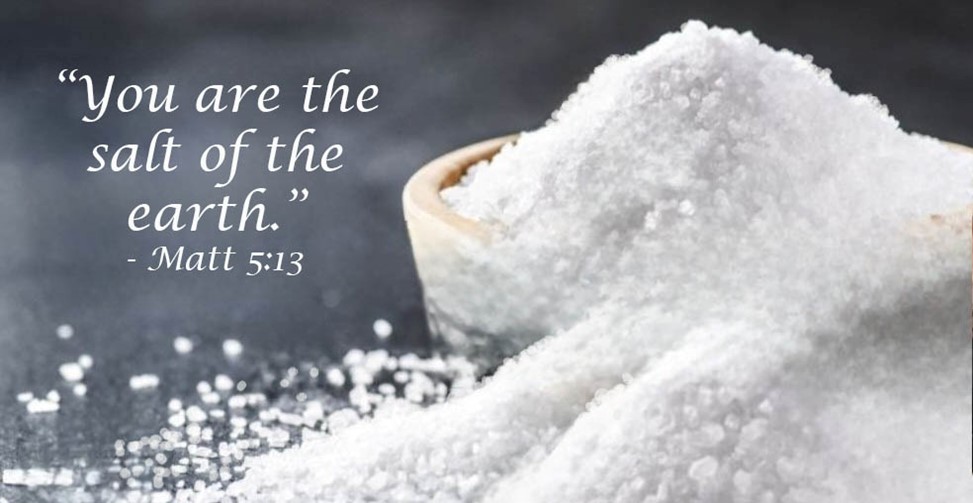
Philippe de Rosen, cicm
Missionary in Belgium
When Jesus spoke, he often had something in front of him to use as teaching material.
The exegetes hypothesize that at this moment, he saw people destroying an old bread oven and scattering the waste in the ruts in the road caused by erosion. Hence his remark at the end of the sentence: "When salt has lost its flavor, all it is good for us to be thrown out and trampled underfoot by men."
In fact, in Jesus' day, bread ovens were made from blocks of earth mixed with salt from the Dead Sea; these blocks acted as refractory stones: they had noticed that the salt allowed the heat to accumulate in the oven and then, with the fire removed, to bake the loaves without burning them.
Through baptism, Christians receive the fire of God's love: if they have the SALT of faith within them, they can welcome the fire of God's Spirit and radiate it around them.
Salt lost its power to welcome fire, so the ovens were destroyed. However, it could be used to consolidate paths damaged by erosion and trampled underfoot by people, as Jesus says in the Gospel.
Let us keep the salt of faith, and we will radiate around us the Love that God has placed in our hearts (Mt. 3:17: liturgical translation). In the past, salt was also used to preserve food, when we did not have a fridge. Salt preserves.
Salt can also be a sign of fidelity, of incorruptibility (=something that does not go to waste): the Bible speaks of a Covenant of salt.
Salt also gives taste to food: Christians are called to give taste to life, to provide that essential touch to life in society: the gift of self, the service of others. Through love we will transform the world.
Message on the Internet (2003)
Copyright: Association Apostolat Sainte Thérèse
"I'll use an example to show how our ignorance of the Palestinian environment makes a parable obscure. I'm talking about the parable of the SALT: "You are the salt of the earth" (Mat 5:13) and in another form in Mark 9:50 and Luke 14:34-35: "You are the salt of the earth, if the salt loses its flavor, with what shall it be salted? It is good only to be thrown out and trodden underfoot by men".
"If the salt loses its flavor!" Do you know of a salt that is no longer salty? There is no such thing; what does it refer to? And why say this salt is thrown on the ground and walked on?
In general, the Fathers of the Church did not know well Palestine. They were Greeks and had a profound contempt for "barbarian" civilizations. They said a lot of things about salt: salt is what preserves food; it's what prevents it from rotting. In the end, we never understood what Jesus meant when he said: "You are the salt of the earth." And then, some thirty years ago, a Swiss sociologist went to live in a small village in Palestine, in the Hebron region, to carry out a sociological study of the customs of Palestinian Bedouin life. One day he came across some children trampling along a path, breaking salt slabs and trampling the salt underfoot.
He asked them: "What is this salt? - It's the salt from the oven", they replied. [In Aramaic, "salt from the oven" is more or less the same word as "salt from the earth" because "oven" and "earth" are more or less the same word arsa.
The scholar said to them, "What is this salt from the oven?" - Ah well... it wouldn't burn if we didn't put any salt in it".
In Palestine, there is very little wood, and in the Arab villages, the fuel most used for cooking is camel dung. But I wouldn't advise using camel dung for heating because it burns badly. They also use salt, but not ordinary salt, salt from the Dead Sea, which is very rich in magnesium chloride. Our sociologist took one of these pieces of salt and sent it to a friend of his who was a chemist so that we could study the salt and see to what extent it could help combustion. They discovered that it was a catalyst that made it possible to make fire with things that burn badly, with much less wood than is usually needed. According to the Bible, burnt offerings were sometimes made with 12 bulls at the Temple in Jerusalem. You can imagine how much wood was required [ And the ritual for the holocaust says that the victims must be "salted" for the fire (Ez. 43,24. Lev. 2,13) ], so that it would burn with less wood. And St Mark tells us that: "every man shall be salted for the fire" 9, 50 - cfr TOB note c
"Salted for the fire". What does this mean? It makes sense when you realize salt was used to facilitate combustion in Palestine then. You will also remember that Jesus said: "I have come to set fire on the earth; what do I want but for it to burn? (Luke 12, 49). If you put that in the background, what does Jesus mean when He tells us: "You are the salt of the earth"?
Well, it's one of the most beautiful definitions of apostolate: you are the catalysts. The fire is God's action, it's the Spirit. The task of the apostle is not to be the fire but to be the one whose presence allows the fire to spread to propagate. He fans the fire. That's what the apostle is. He's someone whose presence allows the fire of the Spirit to take hold and the word to spread. I've developed this example at length because it seems to me to be very instructive of what archaeology and the study of the environment can contribute to understanding a parable that was a closed letter to us".
Through baptism, Christians receive the fire of God's love: if they have the SALT of faith within them, they can welcome the fire of God's Spirit and then radiate it around them.
Salt lost its power to welcome fire, so the ovens were destroyed. However, they could be used to repair paths damaged by erosion and were therefore trampled underfoot by people, as Jesus says in the Gospel.
Let us keep the salt of faith, and we will radiate around us the Love that God has placed in our hearts (Mt. 3, 17: liturgical translation)
God has placed his love, his fire, in us. How can we nurture it? How can I be the salt that allows this love to shine forth?









